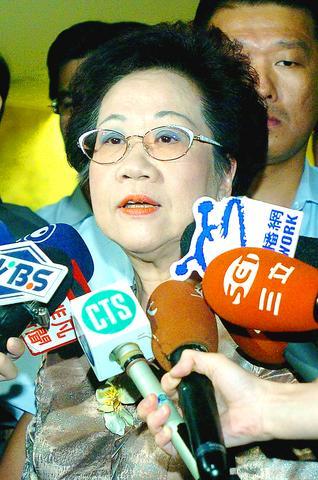Pop star Chang Hui-mei (
The Taiwanese pop diva, better known as A-mei, again found herself at the center of political controversy yesterday. But unlike last time, when China enforced a media blackout and she received threats from Chinese ultra-nationalists, A-mei is now under fire from those who champion Taiwanese pride.

PHOTO: LIAO CHENG-HUEI, TAIPEI TIMES
The Puyuma Aboriginal singer said she was shocked that some TV talk show hosts urged a boycott of her upon her return from her concert in Beijing last Saturday. Wang Ben-hu (
A-mei was quoted in by CCTV as saying "I had to suffer the consequences of a decision that was not made by me ... I should have been more discreet in my behavior, which impacts so many people."
Vice President Annette Lu (
"How could anyone not have any political consciousness?" Lu said. "If A-mei's being oppressed by China resulted from her performance of the national anthem, A-mei should say out loud [to China]: `It is my right to sing the Republic of China's national anthem. You Chinese people can sing your national anthem, why can't I sing mine?'"
Lu added, "I can understand why A-mei didn't say it, because she is still young. But if the two governments were at war, would it be more important for A-mei to sing in Beijing or to defend the 23 million people [of Taiwan]?"
The vice president and others' comments prompted the 31-year-old singer to make a brief response yesterday afternoon at a press conference.
"I am just a singer," the diva said. "I am not capable of dealing with politics. Many things are out of my control ... The world of grown-ups should be left to grown-ups. We all know that singers should not be involved in politics."
The singer made it clear that she has no intention of engaging in anything irrelevant to her profession. A-mei also called on the media to cease its sensational reporting and stop distorting her words. "What we really need is more peace and love in our society," said the singer.
As for her questioned patriotism, A-mei said she will be a representative for the Tourism Bureau and that her goal is to introduce the country's beauty and the goodwill of its people to a wider international audience.
Meanwhile, Premier Yu Shyi-kun yesterday offered a clarification of his own previous remarks about the singer. Local media had reported Yu as making critical remarks about A-mei. But yesterday, he explained that his remarks were intended to criticize China, and that he had not intended to criticize the singer herself. He said local media had misquoted him.

‘TAIWAN-FRIENDLY’: The last time the Web site fact sheet removed the lines on the US not supporting Taiwanese independence was during the Biden administration in 2022 The US Department of State has removed a statement on its Web site that it does not support Taiwanese independence, among changes that the Taiwanese government praised yesterday as supporting Taiwan. The Taiwan-US relations fact sheet, produced by the department’s Bureau of East Asian and Pacific Affairs, previously stated that the US opposes “any unilateral changes to the status quo from either side; we do not support Taiwan independence; and we expect cross-strait differences to be resolved by peaceful means.” In the updated version published on Thursday, the line stating that the US does not support Taiwanese independence had been removed. The updated

‘CORRECT IDENTIFICATION’: Beginning in May, Taiwanese married to Japanese can register their home country as Taiwan in their spouse’s family record, ‘Nikkei Asia’ said The government yesterday thanked Japan for revising rules that would allow Taiwanese nationals married to Japanese citizens to list their home country as “Taiwan” in the official family record database. At present, Taiwanese have to select “China.” Minister of Foreign Affairs Lin Chia-lung (林佳龍) said the new rule, set to be implemented in May, would now “correctly” identify Taiwanese in Japan and help protect their rights, the Ministry of Foreign Affairs said in a statement. The statement was released after Nikkei Asia reported the new policy earlier yesterday. The name and nationality of a non-Japanese person marrying a Japanese national is added to the

AT RISK: The council reiterated that people should seriously consider the necessity of visiting China, after Beijing passed 22 guidelines to punish ‘die-hard’ separatists The Mainland Affairs Council (MAC) has since Jan. 1 last year received 65 petitions regarding Taiwanese who were interrogated or detained in China, MAC Minister Chiu Chui-cheng (邱垂正) said yesterday. Fifty-two either went missing or had their personal freedoms restricted, with some put in criminal detention, while 13 were interrogated and temporarily detained, he said in a radio interview. On June 21 last year, China announced 22 guidelines to punish “die-hard Taiwanese independence separatists,” allowing Chinese courts to try people in absentia. The guidelines are uncivilized and inhumane, allowing Beijing to seize assets and issue the death penalty, with no regard for potential

‘UNITED FRONT’ FRONTS: Barring contact with Huaqiao and Jinan universities is needed to stop China targeting Taiwanese students, the education minister said Taiwan has blacklisted two Chinese universities from conducting academic exchange programs in the nation after reports that the institutes are arms of Beijing’s United Front Work Department, Minister of Education Cheng Ying-yao (鄭英耀) said in an exclusive interview with the Chinese-language Liberty Times (the Taipei Times’ sister paper) published yesterday. China’s Huaqiao University in Xiamen and Quanzhou, as well as Jinan University in Guangzhou, which have 600 and 1,500 Taiwanese on their rolls respectively, are under direct control of the Chinese government’s political warfare branch, Cheng said, citing reports by national security officials. A comprehensive ban on Taiwanese institutions collaborating or